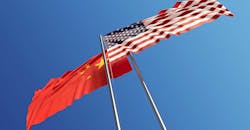Last week, President Trump announced the initial details of a potential ‘Phase One’ agreement, in principle, with China. So far, it appears that the oral agreement discussed by the president covers agriculture, intellectual property, financial services, currency, and trade enforcement. However, the overall details remain unclear and are not fully developed. It’s expected that the United States will keep in place existing tariffs against Chinese imports—but will not raise them. And any agreement will not be finalized until and unless the two countries produce a written document. That text is expected within five weeks, which would allow President Trump and China’s President Xi to hold a signing ceremony during an economic summit in Chile.
After years of predatory trade on the part of China—including dumping, massive subsidies, currency manipulation, and IP theft—it’s commendable that the Trump administration has aggressively used the leverage of tariffs to address trade cheating and the threat that China’s rise poses for America’s military, economic, and geopolitical strength. It remains to be seen, however, whether hardliners in Beijing will scuttle the agreement, just as they did last May when they rejected months of previous negotiations.
Trump administration officials said that Phase One will encompass some of the easier issues currently in dispute. Most notably, when it comes to Beijing’s aggressive retaliation against America’s farmers, it looks like China has agreed to reduce tariffs on U.S. agricultural products. Beijing would also purchase $40-50 billion worth of agricultural products over the next two years while eliminating certain technical rules blocking US farm exports.
Another sensitive area is intellectual property. It’s estimated that IP theft on the part of Chinese firms is costing US companies as much as $600 billion annually. So far, however, the president has only said that some intellectual property items would be covered in Phase One. But more would need to be done in a potential ‘Phase Two’ agreement.
When it comes to equity markets, Beijing has agreed to allow U.S. financial services firms to operate in China. Apparently, Beijing will relax current rules that require U.S. firms to form joint ventures with Chinese counterparts.
Some elements of the deal remain unclear. While there appears to be an agreement regarding currency and exchange rates, the details have not been released. Similarly, any mechanisms to ensure enforcement of an overall deal are especially tricky, and may not be agreed to. The only relevant information forthcoming is that Treasury Secretary Steven Mnuchin has said that both parties will set up offices to deal with disagreements—with an eye toward resolving them before resorting to enforcement actions.
The U.S. will continue its existing tariffs, but would agree not to increase them. There’s also been no decision on whether planned tariffs on a final list of goods will take effect on December 15. There have been some indications, though, that a written Phase One deal would result in shelving tariffs on that final list.
Whether the Phase One agreement can be finalized remains to be seen. But it’s clear that President Trump’s actions—including a robust set of tariffs—have brought China to the table. This is a major shift from previous administrations that simply assumed open trade with Beijing would liberalize China’s economic and political standing. That hasn’t worked. But President Trump’s direct approach has improved the U.S. economy and caused China’s growth to slow.
If Phase One is finalized in writing, any negotiations on Phase Two issues would be harder. If China breaches Phase One, that will make Phase Two impossible—and will result in increased tariffs. A broader decoupling from China is possible and possibly desirable, just as the United States decoupled from the Soviet Union during the Cold War.
The Coalition for a Prosperous America (CPA) is pleased that, even with the announcement of a potential Phase One agreement, the president is keeping existing tariffs in place. To date, the tariffs imposed on subsidized imports from China’s state-owned enterprises have helped CPA’s member companies to grow market share, hire workers, and increase wages. CPA continues to support strong trade enforcement against China, and remains skeptical that Beijing will ultimately comply with any meaningful concessions.
Retaliation against farmers has been a significant concern for CPA. And although farm prices are now rebounding, what’s needed is an aggressive overall agricultural industry strategy to reduce the boom-bust cycles that are driving farmers and ranchers out of business.
Currency issues continue to matter as well. Because the U.S. dollar is fundamentally misaligned in relation to both China’s renminbi and other major currencies, the Trump administration should be certain to avoid language that might hinder a realigning of the dollar’s exchange rate.
There are other pressing issues when it comes to China trade, with many Chinese companies posing significant risks to America’s national and economic security. This requires a continued, broad focus, and the administration should act, for example, to require that meat products bear a country of origin label. It should also delist Chinese companies from US equities markets when they avoid auditing oversight or engage in sanctionable conduct.
These are important steps, and the Trump administration should continue to take a hard line against China’s aggressive behavior.
Michael Stumo is CEO of the Coalition for a Prosperous America (CPA), a bipartisan organization representing U.S. manufacturers, labor unions, farmers and ranchers.
About the Author
Michael Stumo
CEO
Michael Stumo is CEO of the Coalition for a Prosperous America, a nonprofit organization working at the intersection of trade, jobs, tax and economic growth.
